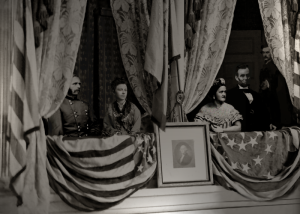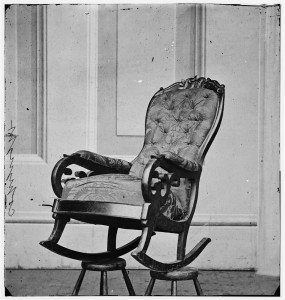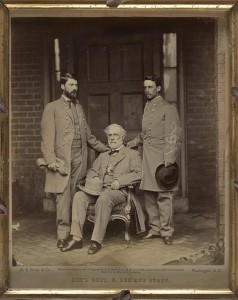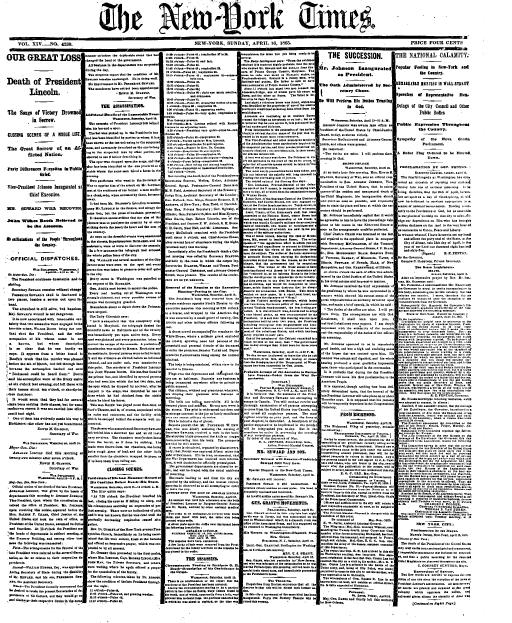From a Seneca County, New York newspaper in 1865:
WASHINGTON, April 15 – 11 A.M.
At 20 minutes past 7 o’clock the President breathed his last, closing his eyes as if falling asleep, and his countenance assuming an expression of perfect serenity. There were no indications of pain, and it was not known that he dead until the gradually decreasing respiration ceased altogether.
The Rev. Dr. Gurley, of the New York Avenue Presbyterian Church, immediately on its being ascertained that life was extinct, knelt at the bedside and offered an impressive prayer which was responded to by all present.
Dr. Gurley then proceeded to the front parlor, where Mrs. Lincoln, capt. Robert Lincoln, Mrs. John hay, the Private Secretary’s wife, and others were waiting, when he again offered a prayer for the consolation of the family.
DETAILS OF THE OCCURRENCE
President Lincoln and wife, with other friends, this evening visited Ford’s Theatre for the purpose of witnessing the performance of the “American Cousin.”
It was announced in the papers that Gen. Grant would also be present, but he took the late train of cars for New Jersey.
The theatre was densely crowded, and everybody seemed delighted with the scene before them. During the third act, and while there was a pause for one of the actors to enter, a sharp report of a pistol was heard, which merely attracted attention, but suggesting nothing serious, until a man rushed to the front of the President’s box, waving a dagger in his right hand, and exclaiming, “Sic semper tyrannis,” and immediately leaped from the box, which was in the second tier, to the stage beneath, and ran across to the opposite side, making his escape amid the bewilderment of the audience from the rear of the theatre, and mounting a horse, fled.
The screams of Mrs. Lincoln first disclosed to the audience that the President had been shot, when all present rose to their feet, rushing towards the stage, many exclaiming “Hang him! hang him!”
The excitement was of the wildest possible description, and of course there was an abrupt termination of the theatrical performance.
There was a rush towards the President’s box, when cries were heard: “Stand back and give him air.” “Has any one stimulants.” On a hasty examination, it was found that the President had been shot through the head, above and back of the temporal bone, and that some of the brains were oozing out. He was removed to a private house opposite to the theatre, and the Surgeon-General of the army, and other surgeons sent for to attend to his condition.
On the examination of the private box blood was discovered on the back of the cushioned rocking chair on which the President had been sitting, also on the partition and on the floor. A common single-barreled pocket pistol was found on the carpet. A military guard was placed in front of the private residence to which the President had been conveyed. An immense crowed [sic] was in front of it, all deeply anxious to learn the condition of the President. It had been previously announced that the wound was mortal; but all hoped otherwise. The shock to the community was terrible.
The President was in a state of snycope, totally insensible, and breathing slowly. –
Later that day General Lee returned to his Richmond home. From a Seneca County, New York newspaper in 1865:
Arrival of Gen. Lee in Richmond.
Gen. Robert E. Lee arrived in Richmond on the afternoon of the 15th. The first intimation of the arrival was the call made upon Lieut. H.S. Merrell, Post Quartermaster at Richmond, for forage and stabling for twenty horses in behalf of Gen. Lee. Shortly after three o’clock the General arrived on the pontoon bridge that spans the James between Richmond and Manchester. Here an immense crowd had collected to receive him, and he was greeted with cheers upon cheers, the acclamations of the people, so generously and heartily bestowed, visibly affecting him. – As he passed the Union officers they raised their caps. As he proceeded along the streets to hid residence in Franklin street, the crowd increased in numbers, and the cheers grew louder. The General was accompanied by five members of his staff, Gen. Lee and all wearing swords. As he dismounted at his residence, the thousands [of] people who surrounded him again greet[ed] him with acclaims, and so many as could [get] near his person, shook him by the hand. [The] good feeling in relation to Gen. Lee [w]as common among both Unionists and Rebels, and was fully shared in by all. – Gen. Lee looked exceedingly robust, and is certainly a most splendid specimen of a soldier and gentleman, with fair forehead, grey hair, bronzed countenance and military beard. He will doubtless see the military dignitaries here quietly, before he leaves the city again – the taking place of which latter event is now positively known.
– Richmond Cor. Herald.
At least one observer said it was a quieter celebration of Robert E. Lee’s arrival. Gene Smith [1]quotes T.C. DeLeon: “There was no excitement, no hurrahing; but, as the great chief passed, a deep, loving murmur, greater than these, arose from the very hearts of the crowd. Taking off his hat and simply bowing his head, the man great in adversity passed silently to his own door; it closed upon him, and his people had seem him for the last time in his battle harness.”
Apparently the news of the assassination of Abraham Lincoln got to Richmond during the evening of the 15th. From a Seneca County, New York newspaper in 1865:
How the News was Received in Richmond.
The Richmond correspondent of the World says that on Saturday evening at 9 o’clock, Gen. Ord, commanding at Richmond, and Gens. Ould and Mumford, rebel and Federal commissioners of exchange, were sitting in the room of Colonel John W. Forney in the Spottswood Hotel, when a telegraph message was handed in conveying the intelligence of the President’s death. The three Northern gentlemen were demonstrative in alternate bursts of incredulity, anguish, and indignation; but Ould said:
“That is the worst blow the confederacy has yet had; Lee’s surrender is nothing to it.”
The people in Richmond are already anxious to express their disapprobation of the assassination, while the more radical officers are overzealous to saddle upon the state, in advance of fuller corroboration, the whole responsibility of the deed. Mr. Hunter, ex-Senator, has left the town post-haste, and Judge Campbell also expresses a desire to be out of the lowering atmosphere. It is not the best news in the world for General Lee, who galloped into Richmond on Saturday with a full staff, and has spent the night in close reticence.
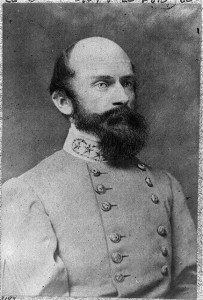
“Richard Stoddert Ewell, 1817-1872, bust portrait, facing right; in uniform. CSA general” (Library of Congress)
Old Bald Head learned of the Lincoln assassination in New York City. From a Seneca County, New York newspaper in April 1865:
The rebel Gen. Ewell, who took command of Stonewall Jackson’s Division after the death of that General, is now held by our authorities as a prisoner of war. Saturday morning he passed through New York on his way to Fort Warren. “While breakfasting in the Soldier’s Rest, in 4th avenue, he was told of the assassination of Mr. Lincoln, and not only expressed his deep regret, but seemed to be painfully affected by what he deemed was the most afflicting intelligence the South could now hear.”
According to the Library of Congress the photograph of Robert E. L was taken on April 16, 1865 and “n verso: General Robert E. Lee seated between his son, G. W. C. (Custis) Lee on his right and Lt. Colonel Walter H. Taylor on his staff. This picture taken by Brady in 1865 in the basement below the back porch of Lee’s Franklin Street home in Richmond, Virginia”
Steve Woolf’s depiction of the assassination is licensed by Creative Commons
Some Seneca County newspaper clippings on Lincoln’s assassination and death present the same thick black boundaries between columns as in the New-York Times below. The Times of April 16th featured sort of a continual recap of the President Lincoln’s respiration and pulse rates from 11 PM on the 14th to 7:22 AM on the 15th.
- [1]Smith, Eugene O. Lee and Grant, A Dual Biography. New York: Promontory Press, 1984. Print. page 282.↩


